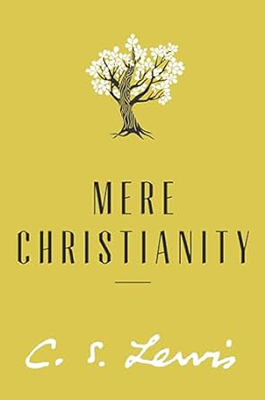Mere Christianity
“Mere Christianity” is a theological book by C.S. Lewis, originally published in 1952. It provides a defense and explanation of Christianity that aims to appeal to a broad audience, regardless of denomination. Here’s a summary:
Main Themes:
The Law of Nature: Lewis begins by arguing for the existence of a universal moral law, which he calls the “Law of Nature” or “Moral Law.” He suggests that this innate sense of right and wrong points to the existence of a higher power, whom he identifies as God.
Christian Morality: Building on the concept of the Moral Law, Lewis explores the implications of Christian morality, emphasizing virtues such as love, forgiveness, humility, and selflessness. He argues that these moral principles are central to the Christian faith and are essential for human flourishing.
The Case for Christianity: Lewis presents a logical argument for the truth of Christianity, drawing on aspects of philosophy, theology, and personal experience. He addresses common objections to the Christian faith and offers rational explanations for core Christian doctrines, such as the Trinity, the Incarnation, and the Atonement.
The Role of Jesus Christ: Central to Lewis’s argument is the significance of Jesus Christ as the Son of God and the savior of humanity. He explores Jesus’s life, teachings, death, and resurrection, emphasizing their profound implications for human salvation and redemption.
Key Concepts:
– Christian Unity: Lewis advocates for a “mere Christianity” that transcends denominational differences and focuses on the core beliefs shared by all Christians. He emphasizes the importance of unity within the Church and the need to prioritize essential doctrines over secondary theological disputes.
– Free Will and Moral Choice: Lewis discusses the concept of free will and its implications for moral responsibility. He argues that God grants humans the freedom to choose between good and evil, despite the risks of sin and suffering that accompany this freedom.
– Joy and Longing: Throughout the book, Lewis explores the themes of joy and longing as fundamental aspects of the human experience. He suggests that these feelings point to a deeper spiritual reality and ultimately find fulfillment in God.
Legacy:
“Mere Christianity” remains one of C.S. Lewis’s most influential works, celebrated for its clarity, accessibility, and intellectual rigor. It has inspired countless readers to explore the Christian faith and has served as a cornerstone of Christian apologetics for decades. Despite being written over half a century ago, its insights into the nature of faith, morality, and the human condition continue to resonate with audiences around the world.

